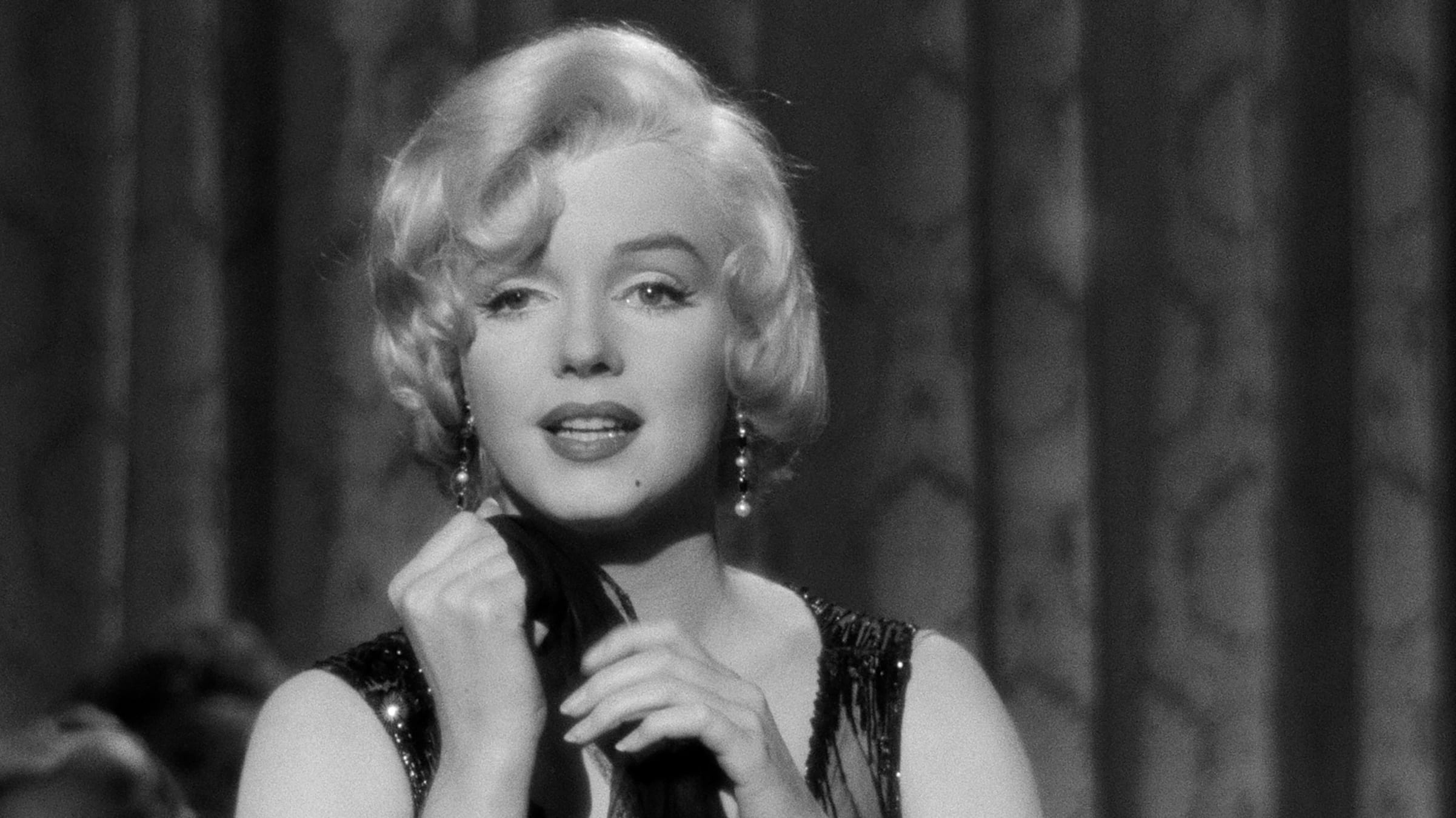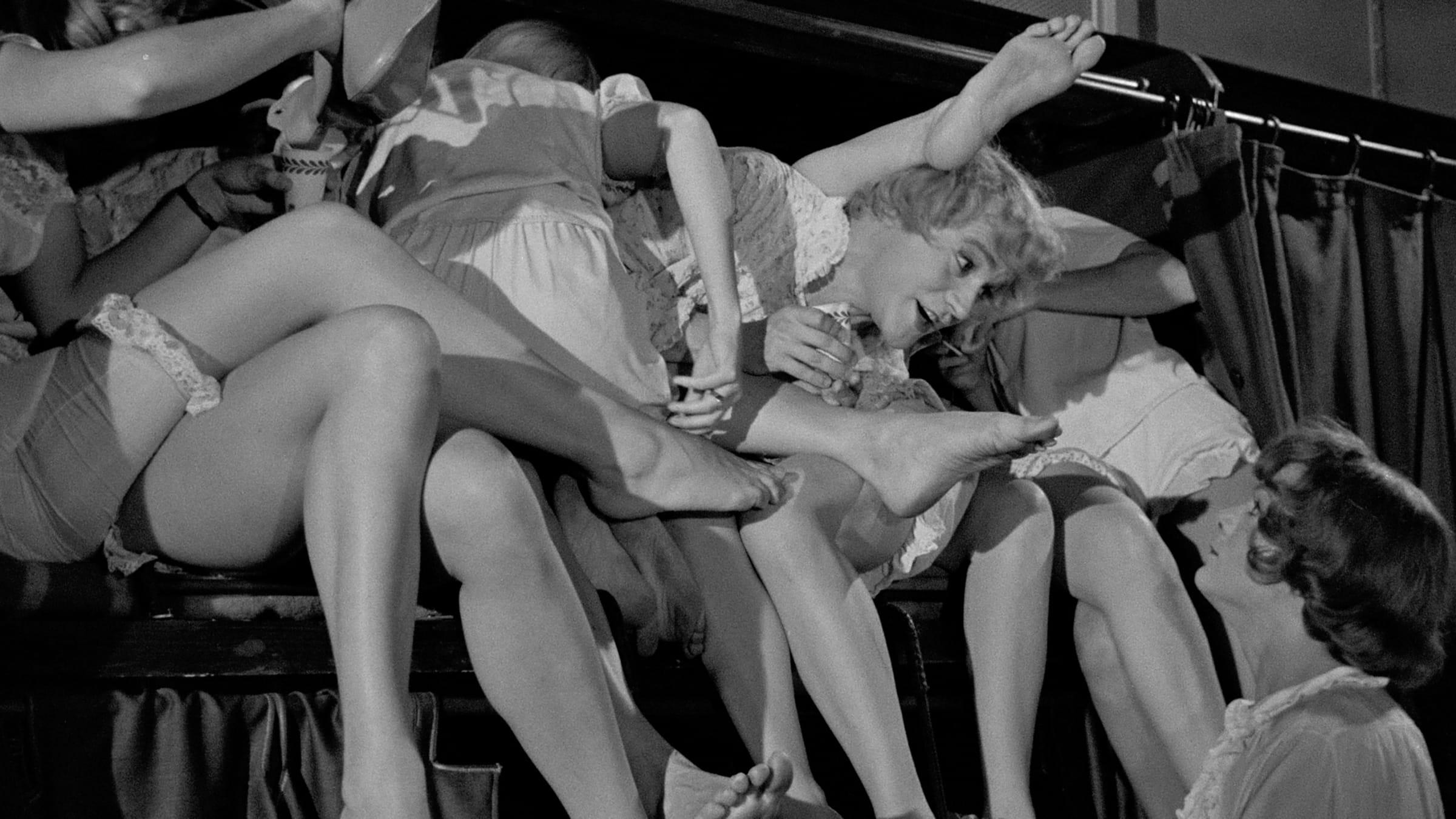Again, Wilder just wanted to have a good time. Look at how he used his camera: not to manage our thinking (like Alfred Hitchcock), not to get us to feel what the characters are feeling (like Nicholas Ray), and not to editorialize on the drama (like Capra). His stance is simply amoral, which is the stance you want to have when you want to have maximum fun. Many of Wilder’s detractors dismiss this amorality as misanthropic, and in his later comedies, which aren’t fun but mean, the comedy does curdle, but when properly and justifiably channeled, as in Ace in the Hole (1951), Wilder’s cynicism excavated—and not gleefully—the intestinal lining of the American digestive tract. Who can argue? There’s a lot in capitalism to feel misanthropic about.
For Monroe, Wilder breaks his stance. He comes a little closer. He says, “I hope you enjoy this woman. I sure do.” More than any other director ever had or ever would, Wilder got Monroe inside and out, what she could do well and what she couldn’t. “The charm of her is two left feet,” he said. “Otherwise she may become a slightly inferior Eva Marie Saint.” Others had made the mistake of taking Monroe for an actress of real range; she wasn’t. Some took her only at face value, but she was, as we all know, something deeper than merely beautiful. Wilder split the difference. He understood that for all her sadness—which Some Like It Hot calls for—Marilyn the performer was a light comedian. Marilyn the woman was a girl. Here’s her skeleton key: “When I was a little girl, on cold nights like this,” her character, Sugar Kane, whispers giddishly to Jerry-as-Daphne in the sleeper-car bunk they are sharing as a train takes the band down south, “I used to crawl into bed with my sister. We’d cuddle up under the covers and pretend we were lost in a dark cave and were trying to find our way out.” This wholesome innocence, coupled with that figure that suggests not-so-innocent things, let her have her cake and eat it too; it was the paradox that made her a star. “How do I know about a man’s needs for a sex symbol?” she once asked. “I’m a girl.”
We know Marilyn is hot, but Wilder saw that she was warm too, and in Some Like It Hot, he permits her coziness to cuddle some clemency into his ruthless good time. She is the heart of the comedy, the only one not playing for laughs (though she gets them), and if you, like me, think she walks away with the picture, it’s because Wilder handed it to her. Rarely does Lemmon or Curtis have the screen to himself; Monroe often does. Her close-ups—a rare occurrence in Wilder country—reveal a girl twinkling with chaste enthusiasms. “Good niiiiiight, Sugaarrrr,” Jerry stage-whispers to her across the train car. She pops her head out of her bunk, and after a vulnerable split second wondering who called to her, she opens into the most playful, the most self-nourished, the most sincere smile I’ve ever seen in a movie. It’s not sexy. It’s genuinely happy. “Good night, honey!”
And here we are again, back
to having a good time. “A good time”: not a phrase we readily associate with
the famously heartsick Marilyn Monroe. Seeing her so happy must have been fun
for Some Like It Hot’s 1959 audiences, but for us, knowing
what we know about her depression and self-loathing and death, watching Marilyn
truly enjoy herself is, today, the movie’s most painful pleasure. When she
calls back, “Good night, honey!” I’m probably not alone in feeling, in addition
to delighted, very sad, and not because we lost in Monroe a great artist (she
wasn’t), or a great beauty (she was), but because, in Some
Like It Hot, it’s clear she was, at times, abundantly capable of
enjoying life.
I think it is way past time
we celebrated Wilder for his women: Sabrina, Phyllis Dietrichson, Norma Desmond, Fran Kubelik . . .
His roster
of terrific male protagonists nearly obscures the dames, the
floozies, the killers, the broken adorables, and
the upstanding, virtuous Congresswoman Phoebe Frost (Jean Arthur) in the
lamentably underrated A Foreign Affair (1948). The
greatest line Wilder ever wrote, he wrote for a woman: “I don’t go to church.
Kneeling bags my nylons”—Lorraine Minosa (Jan Sterling), Ace
in the Hole. And let’s not forget Ninotchka and Ball
of Fire’s Sugarpuss O’Shea, characters he cowrote for Ernst Lubitsch and
Howard Hawks to direct. With the exception of Sabrina, these characters all
have Wilder’s trademark tough candy shell and cream-filled center (Garbo laughs
in Ninotchka, remember?)—even the duplicitous Mrs.
Dietrichson, who, in the final second before her death, looks at Walter Neff,
after he shoots her, with a desperate, silent, “Why, Walter, why? I really
loved you.” Those who leave Wilder at “misanthropic” forget that you have to
have a heart to have it broken. Look at the women. They’re Wilder’s heart.



